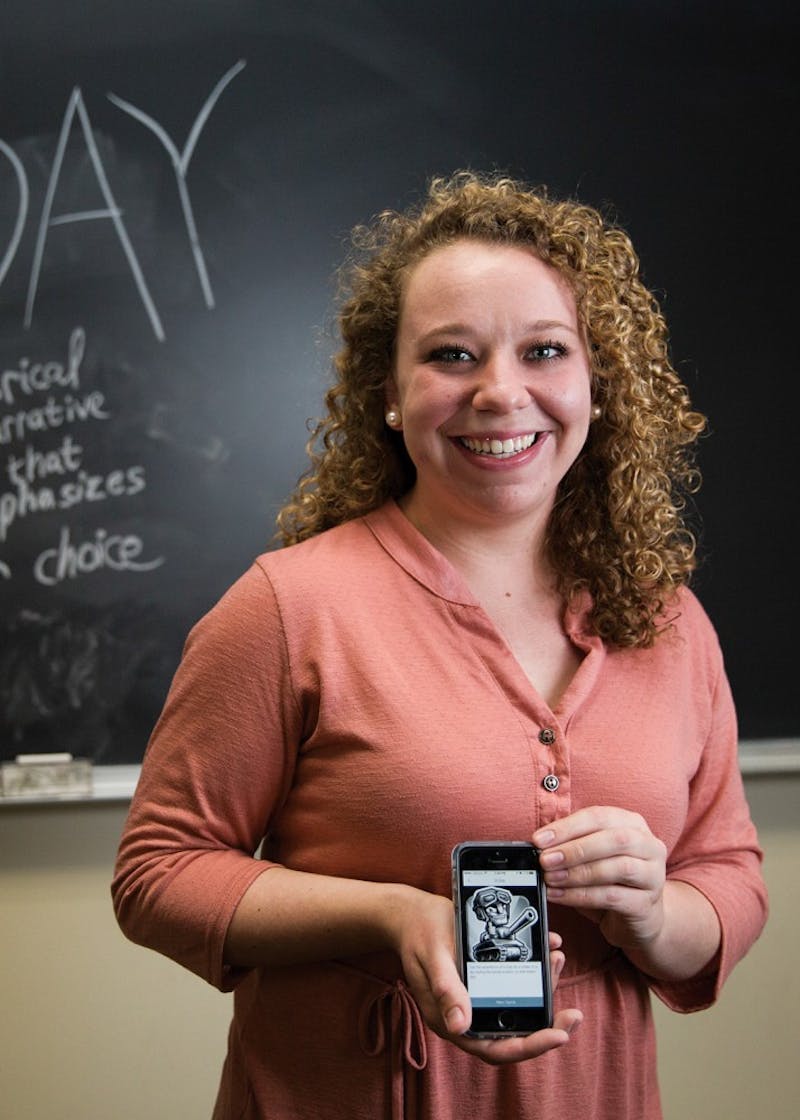

ABBEY MARSHALL / STAFF WRITER
While some teachers restrict phone usage in the classroom, Amie Musselman encourages it in the form of a history app she developed for students.
Musselman, a junior studying middle childhood education, created the app “D-Day” through a web-development site “Aris” in an attempt to educate students about the historical raid of the Normandy beaches in a unique way. The “D-Day” app is available to download through the Aris app, which is free to download on the App Store.
“(D-Day is) a historical narrative that emphasizes player choice,” she said. “The gamer gets a persona of Jack Clippinger, which is a soldier on the first wave over to France. … Depending on your choices, you either die or survive D-Day.”
There are nine outcomes of the game, three of which result in the player surviving and winning the game and one of which allows the player to receive a purple heart.
The game starts with a YouTube video of U.S. President Dwight Eisenhower’s speech over footage of D-Day. The player must then select where they are going.
“You have to know where it occurred and place it on the map,” she said. “You can talk about D-Day and some people don’t know where that happened. You have to know it’s in France.”
The player is then offered an array of choices to consider in a war scenario. The game also allows the player to interact with real historical figures, including President Theodore Roosevelt’s son, who was a key figure during the invasion of the Normandy beaches.
If the player does not survive, the game will loop to the beginning and they can try again. If they succeed, the game ends with a clip of footage from World War II.
Musselman first created the app with a partner her freshman year as part of a class to incorporate education into mobile media. She hasn’t changed the content, but has made “minor tweaks” to the game.
“History usually isn’t the favorite,” she said. “People groan and grudge at the idea of history, like ‘How does it affect me today?’ That was my goal: to use a modern mode of technology to then teach history. While this is not a full invasion of Normandy lesson, it could augment it.”
As part of her education in the Patton College of Education’s honors program, Musselman is required to develop a thesis and conduct a research project. In February, she went to a high school to conduct her research study in an American history class.
Prior to her arrival, the teacher gave the students a lesson on D-Day. Musselman collected data from 87 students utilizing a pre-survey and then had students play her game. Following the game, she had students take a post-survey. She said about 10 or 15 more participants said the app improved their enjoyment of social studies.
Musselman said teachers’ backlash is not realistic and rather than banning technology, they should embrace it.
“At school, if they’re not being used, the students will go home and use it for hours on end,” she said. “It’s a disconnect. To bridge that gap, we can use it as a tool.”
She said technology is integral to teaching in a modern-era and she hopes her app will help students become passionate about history and learning.
“There’s this stigma with using phones and or tablets in the classroom because it can be a distraction,” she said. “If you monitor it well, it could be useful. … The whole goal of history is to acknowledge what happened so those mistakes don’t happen again or to continue on what’s working.”
Photos by : Liz Moughon / Photo Editor
Developed by: Seth Archer / Digital Managing Editor